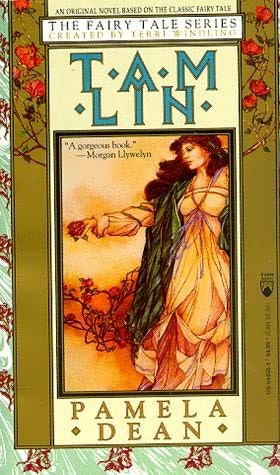
I tried to read Tina Nunnally's gorgeous translation of Andersen's Fairy Tales (Penguin Deluxe, the edition as beautiful as the writing), but discovered that I am no longer an Andersen person. Perhaps I would do better with Grimm. Definitely with contemporary retellings of fairy tales for adults.
The latter is an altogether unusual category that borders on fantasy and, occasionally, polemics. There has been a glut of these retellings of fairy tales since the Second Wave of feminism in the '70s. Angela Carter’s The Bloody Chamber and Other Stories, published in 1979, is a dark, original, exquisitely written collection of reimagined fairy tales, the title story a rendering of "Bluebeard." Robin McKinley’s poetic novel, Deerskin (1993), based on Charles Perrault's horrifying tale of incestuous rape, "Donkeyskin," delineates the courage, survival, and transcendence of the fugitive princess-heroine. Terri Windling’s Fairy Tale series, created for Tor Books, published from 1988 to 2002, also features some intriguing titles, among them Tanith Lee’s fantasy, White as Snow (2000), a retelling of Snow White laced with elements of the myth of Demeter and Persephone.
Pamela Dean's Tam Lin (1991), one of Terri Windling's series, is one of the most charming novels I've read this year. Based not on a fairy tale but on the Scottish ballad, “Tam Lin,” Dean’s novel is set in the 1970s at a small midwestern college where classics majors are rumored to be crazy, a mysterious student is selected by the administration to play bagpipes late at night, and the ghost of a classics major repeatedly throws Chase and Philips, an elementary Greek text, and the Liddell and Scott dictionary out the window of a dorm.
The love of books - the haunting, intense inner life of a reader - is the real theme of this novel (I've read half). The heroine, Janet, a freshman English major, lives through books, and not a page goes by when we don't see her world recreated by new books. Books shape her humor, the richness of her changing world view, her relationships, and her philosophy. She and her friends lovingly, unapologetically discuss literature: The Wind in the Willows, Till We Have Faces, The Children of Llyr, Daughter of Time, Lysistrata, Paradise Lost, A Wrinkle in Time, Aristophanes, Keats, Hamlet, Chaucer, and T. S. Eliot. The list goes on and on.
Here's an excerpt of dialogue about books between two of her friends:
"Are you on terms of such familiarity with all your favorite poets?" said Molly.
Robin provided her with an open and delighted grin, and said, "No, indeed. I'd never speak of Miss Austen so, nor Dr. Johnson, nor even Master Coleridge, though he thought better of himself than he ought to have. But our Will, you see, wrote those Sonnets, and after reading of them, it's hard to be formal with him."
"I suppose it's no ruder than calling them by their last names, like the critics do," said Molly. "As if they were suspects in a murder case."
Thus far the discussions of books ARE the book - and I couldn't be better pleased.

2 comments:
My friend, Farideh, the Iranian poet who has returned to WWTTA (I met her on Wompo) asked me tonight how did I discover poetry. Really the answer was very like this book you are reading. I found myself in effect all alone at around age 18 to 19 and turned to books and began to evolve a dream of a modus vivendi which I told myself I would hold to: it was a life of reading and writing. And the books were my friends.
Then again in my middle 30s I found myself here in Virginia, and now I really found myself alone except for Jim (and he's was around just at night and often not fit for talk) so I began to go to the library to find worlds to belong to.
I agree about this rewriting of fairy tales. Emma Donoghue did some. I've outgrown certain kinds of reactionary stories too: I find I really dislike most of the opera stories -- without the surtitles I never knew what was happening.
E.M.
The dream was achieved, in your case! Readers do have the richest lives, I think.
Janet, the heroine of Tam Lin, has a whole community of people to talk to about books. And their literary conversations are fun to read: slightly unrealistic, perhaps, because the characters so seldom discuss personal life, but not too intellectual.
Post a Comment